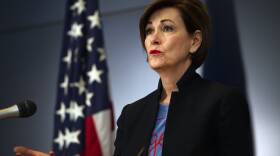EXPLORE MORE
Coming up Monday on BPR:
Michael Curry of the Massachusetts League of Community Health Centers
Leah Hastings of Mass Prisoner Legal Services and Sarah Sherman-Stokes of BU School of Law on what Massachusetts can do to protect against federal immigration actions
Boston coffee legend George Howell, founder of The Coffee Connection and George Howell Coffee
The Culture Show’s Jared Bowen
Recent segments
-
Andrea Cabral: Court Proceedings Move Online During COVID-19 Crisis
The public can now livestream into many court proceedings, but what does this mean for accessibility? -
McGovern Says Reconvening Congress Poses Public Health Risk, Calls For Remote Voting
Rep. Jim McGovern, the Chair of the House Rules Committee, has proposed allowing members of the House to vote remotely or by proxy. -
Playwright Ryan Landry Is Doing Okay, Painting Himself As a Nun
The Gold Dust Orphans Founder talked about his new painting habit, and hopes of staging a “Tiger King” themed Christmas play this December. -
Aloisi Calls For ’Sustainability Response’ To Transportation Overhaul In The Wake of COVID-19
The former state transportation secretary said officials owe it to the essential workers who live in areas where high auto pollution is linked to COVID-19 deaths. -
Americans Are 'Not Ready' For The Country To Re-Open, Says Juliette Kayyem
While some governors are taking steps to open up their states, most Americans aren't ready for this stage, Kayyem says. -
Art Caplan: Nursing Homes Are The 'Forgotten Institutions' Of The Coronavirus Pandemic
Nursing home residents account for more than half of COVID-19 deaths in Massachusetts.
Listen to previous shows
-

BPR Bonus: George Saunders on "Liberation Day"
Writer George Saunders received a MacArthur fellowship in 2006, and his first novel, “Lincoln in the Bardo,” published in 2017, won the Booker Prize. His latest collection of short stories, “Liberation Day,” is scheduled for release on October 18. Ahead of Saunders’ upcoming appearance at Harvard Bookstore (October 25) GBH’s Arts and Culture reporter James Bennett II interviewed Saunders about the writer’s penchant for surreal settings, his quirky -- yet fully realized -- characters and his knack for sublimating the drama of daily drudgery. We hope you enjoy this bonus podcast! -

BPR Full Show: Eggo-Nog
Today on Boston Public Radio: We began the show by asking listeners for their thoughts on the death penalty, after a jury sentenced the Parkland school shooter to life in prison. Shirley Leung talked about her latest piece on Massachusetts Question 1 aka "the millionaire's tax," the return of the looming eviction wave, and the Boston Pops clarinet player who went on to make $100 milllion for Boston University through the stock market. Callie Crossley shared her thoughts on the Jan. 6 hearings, the new Little Mermaid movie, and the newest product from Kellogg: Eggo-Nog. Jared Bowen discussed an MFA’s directors dealings with a dubious English art dealer, “My Obsession” at the Boston Ballet, Step Afrika!’s “Drumfolk,” and shared his thoughts on the movies “Tár” and “Hocus Pocus 2.” Regie Gibson joined us with his Atlas Soul Trio ahead of a pair of shows with the Boston Celebrity Series to talked about his love of language, and play a few songs. -

BPR Full Show: The Latest from the Jan. 6 Committee
Today on Boston Public Radio: Chuck Todd updated us on the latest political headlines, focusing on today’s Jan. 6 hearing. Todd is the moderator of “Meet The Press” on NBC, host of “Meet The Press Daily” on MSNBC and the political director for NBC News. Next, we opened the phone lines, talking with listeners about the January 6th House Select Committee hearings. Andrea Cabral discussed a Connecticut jury ordering Alex Jones to pay Sandy Hook victims’ families nearly $1 billion in damages. Cabral is the former Suffolk County sheriff and secretary of public safety, and former CEO of the cannabis company Ascend. Rick Steves joined us to talk about the essential artwork on view throughout Europe. Steves is a television host, guidebook author, activist and owner and founder of Rick Steves’ Europe. His latest special, “Rick Steves Art of Europe,” is available for streaming on PBS Passport. We then switched to live coverage of today’s hearing on the Jan. 6 Capitol riots. -

BPR Full Show: COVID Liars
Jim and Margery opened the show by taking your calls about a study from the University of Utah which found that 42 percent of Americans lied or misrepresented their adherence to Covid-19 protocols. Medical Ethicist Art Caplan discussed a new experiment out of Japan where researchers implanted transmitters into cockroaches, allowing them to be controlled remotely. Researchers say the technology can be used to assist in search and rescue missions. Caplan is the Drs. William F. and Virginia Connolly Mitty Professor and founding head of the Division of Medical Ethics at NYU School of Medicine in New York City. Juliette Kayyem discussed the implications of President Joe Biden's comments that the world is facing the biggest threat of a nuclear Armageddon since the Cuban Missile Crisis. Juliette Kayyem is former assistant secretary for homeland security under President Barack Obama, and the faculty chair of the homeland-security program at Harvard’s Kennedy School of Government. MIT Economist Jonathan Gruber discussed tactics on how to choose the best healthcare plan during open enrollment period at private companies and for Medicare. Gruber suggested paying close attention to the out of pocket spending limit within your plans. Jonathan Gruber is Ford Professor of Economics at MIT. He was instrumental in creating both the Massachusetts health-care reform and the Affordable Care Act. His latest book is Jump-Starting America How Breakthrough Science Can Revive Economic Growth and the American Dream Michael Curry discussed ways to improve equity in healthcare services as well as the latest racist comments from Senator Tommy Tuberville during a Trump rally. President and CEO of the Massachusetts League of Community Health Centers. He’s also a Member of the National NAACP Board of Directors, where he chairs the board’s Advocacy & Policy Committee We closed the show with a listener call-in session about whether the expectations for tipping have gotten out of hand. -

BPR Full Show: #MeToo
Today on Boston Public Radio: Five years ago, the New York Times and the New Yorker posted allegations against Harvey Weinstein regarding sexual assault. This week Weinstein is beginning another trial now in Los Angeles. With this in mind we wanted to open our lines to ask: in your day to day life, have your lives changed five years on after #MeToo? Is workplace harassment less tolerable or has it stayed the same? Trenni Casey discussed the NFL’s adjusted concussion protocol. She also talked about rookie quarterback Bailey Zappe’s start to NFL life and the Patriots Week 5 game against the Lions. Casey is a reporter and anchor for NBC Sports Boston, and a weekly Boston Public Radio contributor. Trenni Casey on BPR | Oct. 11, 2022 ACLU of Massachusetts executive director Carol Rose discussed the various SCOTUS cases the league is involved in, and the impact of the Biden Aaministration’s marijuana possession pardons and the risk doctors in blue states take by sending abortion pills to red states. Mayor Michelle Wu joined us for the monthly, hourlong segment ‘Ask the Mayor’ where she took questions from both audience members at the Boston Public Library and from listeners. Wu, a Democrat, has been Mayor of Boston since 2021. Biplaw Rai and Kwasi Kwaa of Dorchester’s Comfort Kitchen discussed their new cafe/restaurant located in Upham’s Corner slated to open this month.








